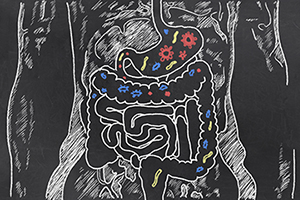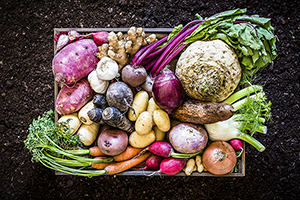



| By Dr. Ronald Hoffman
“All Disease Begins in the Gut.”
It’s a quote attributed to the Ancient Greek physician Hippocrates nearly 2500 years ago. Traditional medical systems acknowledged the primacy of the gut; many remedies for systemic disorders involved purgatives to expel toxins and pernicious humors.
 With the Scientific Revolution, the emergence of a rationalistic model ushered in insights about the process of digestion and nutrient assimilation. This resulted in a more reductive model of the “alimentary canal” as a food tube with little function except as a mere conduit for nutrients and waste products.
With the Scientific Revolution, the emergence of a rationalistic model ushered in insights about the process of digestion and nutrient assimilation. This resulted in a more reductive model of the “alimentary canal” as a food tube with little function except as a mere conduit for nutrients and waste products.
Nevertheless, the early 20th century saw a return to a more global appreciation of the role the GI tract plays in overall physical and mental well-being. The pioneering work of Eli Metchnikoff highlighted the involvement of intestinal microbes in promoting or attenuating “auto-intoxication”; this was accompanied by popular reform movements like those of John Harvey Kellogg—the father of the modern cereal industry—calling for enemas, fiber, and fasting to avert “toxemia.” Radical surgeons even proposed colectomies to cure the “autointoxication” that was a presumed cause of “melancholia.”
The pendulum soon swung back with a firm repudiation of intestinal toxicity as an imaginary hypothesis. In 1912, famed pediatric surgeon Hastings Gilford stated that “autointoxication, the term as we commonly use it, is significant of nothing but a sort of mental flatulency on the part of the user as a substitute for thought.”
Consequently, investigation of the role of the GI tract as a determinant of overall health was kept in abeyance for much of the 20th Century, until a recent resurgence of interest in the microbiome led to a greater appreciation of its role in mediating metabolism, immunity, brain health and endocrine function.
The microbiome is what lies within the anatomical gut. It consists of communities of bacteria, fungi, and viruses. Rather than casual colonizers, the constituents of the microbiome make essential nutrients, provide immunological signaling, perform detoxifying functions, and influence neurotransmitters and hormones.
The essentiality of intestinal flora that make up the microbiome has been underscored by experiments in which germ-free animals encounter numerous liabilities. The composition of the microbiome is, to some extent, genetically programmed; its proper acquisition is encouraged by inoculation via vaginal birth, and supported by humoral factors secreted in breast milk
To turn the conventional paradigm on its head, the GI tract is not merely a conduit for feces, but rather a carefully engineered housing for the microbiome, which in itself may well deserve the status of an organ, with multiple functions.
The makeup of bacteria within our gut determines whether we are likely to have GI conditions like colitis or irritable bowel; psychological states like depression or anxiety, skin disorders like eczema or psoriasis, neurological disorders like multiple sclerosis, Parkinson’s or Alzheimer’s Disease; inflammatory conditions like rheumatoid arthritis, systemic sclerosis and ankylosing spondylitis; even susceptibility to being overweight can be mediated by the microbiome’s impact on thyroid autoimmunity and insulin resistance.
That’s why it matters whether we encourage normal vaginal delivery, breast-feeding, and minimal use of antibiotics for minor infections in kids; avoidance of chemical disinfectants and promotion of outdoor play that allows exposure to dirt; prebiotics from natural dietary fibers and polyphenols, as well as unpasteurized fermented foods furnishing live cultures; and supplemental probiotics.
When microbial overgrowth threatens the balance of our intestinal flora, there are natural compounds that can suppress harmful bacterial and fungal species. Among my favorites are:
Olive leaf, rich in oleuropein
Candibactin AR, delivering aromatic, disinfectant oils
Candibactin BR, whose chief ingredient is berberine
Biocidin, containing gentian, black walnut and wormwood
Allicin, an ultra-potent extract of garlic
All of these products can be found in my new Fullscript dispensary. Simply search the Product Catalog under the Conditions section (Gastrointestinal). Click here to sign up to browse and shop (sign-up is free, and requires only a name and email).
In future years, many-pronged research initiatives are likely to yield an ever more sophisticated understanding of how disease begins in the gut. Seems like we’ve come full circle from Hippocrates’ ancient aphorism!
Though we think of declining estrogen as the hallmark of menopause, it's actually common for…

Up to 12 percent of Americans have ulcers at some point in life. Peptic ulcers…
Gallbladder disease is a modern illness. An estimated 20 million Americans have gallbladder disease. The…

This past week we were regaled with headlines like: High levels of niacin may increase…

March is National Nutrition Month and, needless to say, good nutritious food is essential to…

I recently attended the Integrative Healthcare Symposium (IHS), an annual conference held here in Manhattan. The…

Exploring the Healing Power of Herbs with Dr. Bill Rawls, Part 1

Our virtual voicemail is open 24/7, so there's no need to wait to submit your questions for Dr. Hoffman. Leave a message, and you may hear your question featured on the Intelligent Medicine radio program!